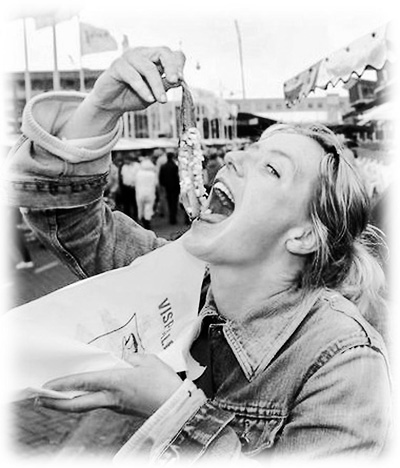 |
| A foreign tourist tasting local food. (File photo) |
Fully prepared vs. relaxed
In the airport, on a flight, or around the tourist sites, we can see many foreigners reading a thick "China travel guide" or carefully checking a city map. Many of them are visiting China for the first time. However, before arriving in China, they have sought out cultural and historical information on their destination from books and the internet.
Compared to the foreigner's serious preparation for a trip, Chinese tourists have a more relaxed approach. Instead of spending their time gathering information, most of them kill time by chatting, watching a movie, playing cards, or sleeping during their journey.
In-depth tour vs. round trip
Many foreign travelers will stay in a city for several days and take time to experience the cultural and human charm of the place. Most Chinese people will choose a package tour arranged by a travel agency for their foreign trips to avoid encountering any potential problems in a strange place. They spend one or two hours at a destination taking pictures and listening to the tour guide, then hurry off to their next destination. Exhausted by their trip, they are still happy to share with friends the photos they have taken at the sites they have visited, for all that they will struggle to tell the difference between one city and another.
Many Chinese have begun traveling abroad for the first time in recent years. They feel curious about the novelty, while at the same time remaining cautious. Some of them still insist on eating Chinese food, avoiding all local food during their travels.
Foreigners, who are more experienced travelers, seem more open to exotic experiences. They like Chinese food, especially local specialties which have gained a worldwide reputation such as Beijing Roast Duck and Tianjin Goubuli (steamed stuffed buns).
In Beijing's Chaoyang and Tianqiao Theaters where Chinese acrobats perform, in the bars in Shichahai in Beijing, in Hengshan Road and Xintiandi in Shanghai where young people gather together, you will always find foreign tourists. They may have spent the day visiting the beautiful landscape; now they are looking to experience the exotic life of the city at night.
Luxury brand shopping vs. Souvenirs
In more and more countries Chinese tourists are becoming the No 1 spenders, both studies and experts confirm. In France, some 87 percent of the average Chinese traveler's total spend goes on fashion items such as shoes and handbags, and 93 percent of their shopping is done in and around the French capital. This craze for shopping is due to two main factors - a booming economy in China, and a price gap caused by high taxes levied on luxury goods in China.
Instead of buying fashion items, foreign tourists prefer to buy souvenirs with a local flavor as gifts for their friends. In China American tourists often buy souvenirs such as pearl necklaces, Chinese paintings, embroidery, thangka, clay figurines and other crafts capturing exotic feelings and experiences.
Personal experience vs. fun of a group
Chinese consider traveling as "having fun" and a relaxing experience. They seldom travel alone but with family or friends. The fun of a group is one of their main pleasures when traveling.
Foreign tourists travel according to their interests and they focus generally on personal experience, so many of them prefer to travel alone. In the United States, you will often see young men on a hiking trip equipped with a free map, a tent, and a back-pack. They may be exposed to cold and wet on a journey but they will find an inner calm on the way.
These different travel habits stem from the different national cultures. Chinese tourism is still in its infancy. Let us start by learning to travel and then move on to traveling to learn.

 Finland has more eggs in the Chinese basket than any other
Finland has more eggs in the Chinese basket than any other In pictures: PLA's digital equipment
In pictures: PLA's digital equipment  Protesters demonstrate during UN Climate Change Conference in Poland
Protesters demonstrate during UN Climate Change Conference in Poland  Self-made farmer billionaire donates 69 villas at hometown
Self-made farmer billionaire donates 69 villas at hometown Demolition of bizarre rooftop villa in Beijing still in progress
Demolition of bizarre rooftop villa in Beijing still in progress Service seminar for E China train attendants
Service seminar for E China train attendants  Supermodel-turned-designer
Supermodel-turned-designer Cheerleaders light up CBA regular season
Cheerleaders light up CBA regular season  Finland--anytime you want is right time to go: Ambassador
Finland--anytime you want is right time to go: Ambassador Maritime counter-terrorism drill
Maritime counter-terrorism drill Splendid views of cities blanketed with fog
Splendid views of cities blanketed with fog  Models dazzle at Int'l Yacht Model Pageant
Models dazzle at Int'l Yacht Model Pageant  How to apply for a green card in China
How to apply for a green card in China Annual Santa Claus parade held in Canada's Montreal
Annual Santa Claus parade held in Canada's Montreal Weekly Sports Photos
Weekly Sports PhotosDay|Week|Month